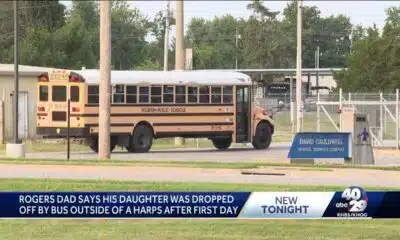News from the South - Alabama News Feed
Trump cites US need in fast-tracking Alabama coal build-out. Most of that coal is exported.
by Lee Hedgepeth, Inside Climate News, Alabama Reflector
May 8, 2025
This article originally appeared on Inside Climate News, a nonprofit, non-partisan news organization that covers climate, energy and the environment. Sign up for their newsletter here.
BROOKWOOD — The Trump administration has announced it will aim to fast track the permitting and environmental review of a major coal mine expansion in central Alabama as part of a larger effort to accelerate the construction of what the government has labeled “critical mineral” infrastructure.
While administration officials said the change is aimed at “significantly reduc[ing] our reliance on foreign nations,” coal produced as part of Warrior Met’s expansion in Alabama is almost entirely exported overseas to support foreign steelmaking markets, according to the company.
Warrior Met’s Blue Creek mine expansion, set to be one of the largest coal build-outs in Alabama history, is one of 20 planned developments deemed “transparency projects” by the administration over the last two months. The mine expansion will be placed on the federal government’s permitting dashboard as it moves its way through the regulatory and permitting process.
GET THE MORNING HEADLINES.
The projects’ inclusion on the dashboard authorized under the 2015 Fixing America’s Surface Transportation Act (FAST) will, according to the Trump administration, “make the environmental review and authorizations schedule for these vital mineral production projects publicly available and allow all of these projects to benefit from increased transparency.
“The public nature of the dashboard ensures that all stakeholders, from project sponsors and community members to federal agency leaders have up-to-date accounting of where each project stands in the review process,” the administration said in its announcement. “This transparency leads to greater accountability, ensuring a more efficient process.”
During the Biden administration, the so-called FAST-41 dashboard was used to fast-track projects aimed at benefiting tribal nations, as well as various projects advancing renewable energy, coastal restoration, broadband and electricity transmission sectors. The program was created as a means “to enhance transparency and increase the efficiency of the permitting process,” the Biden administration said at the time. With a new president, though, the programs designated to participate in the program—and the policy priorities they represent—have now changed.
The Trump administration has already signaled its support of the Alabama project. In April, Interior Secretary Doug Burgum visited an existing Warrior Met mine outside Tuscaloosa and took a windshield tour of the Blue Creek facility currently under construction.
During that visit, Burgum emphasized the administration’s stated commitment to fossil fuel production and said that its actions would “unleash American energy.” He did not acknowledge Warrior Met’s checkered safety and environmental record or that nearly all of its product—metallurgical coal—is shipped overseas for foreign steelmaking operations, not used in the U.S.
“We sell substantially all of our steelmaking coal production to steel producers outside of the United States,” a recent Warrior Met corporate filing said. “For the three months ended March 31, 2025, our geographic customer mix was 37% in Europe, 43% in Asia, and 20% in South America.”
The planned expansion of Blue Creek involves a major build-out of Warrior Met’s ability to mine for underground coal using the longwall method, a particularly destructive form of mining in which large machines shear walls of coal, leaving vast, empty expanses in their wake. Land above those empty caverns sinks, causing what is often permanent damage to the surface and structures there.
Longwall mining has devastated communities in Alabama and beyond. In March 2024, an Alabama home exploded above a longwall mine with a different owner after methane—a gas released during mining—seeped into the residence and ignited. The resulting blast killed an Alabama grandfather and seriously injured his grandson. Since then, the community above the Oak Grove mine in western Jefferson County has continued to crumble, homes’ foundations cracking as the longwall mine expands below.
Earlier this year, just as President Donald Trump was announcing efforts to promote “clean, beautiful coal,” a West Virginia woman was hospitalized after a methane explosion in her home atop a longwall mine left her seriously injured. Workers from the mine beneath her home had stood behind Trump during his White House announcement.
Once completed, Warrior Met’s Blue Creek expansion will increase the company’s coal production by 60 percent, providing additional supply for overseas steelmaking markets hungry for met coal that can meet production needs. Taxpayer-funded support for the facility may top $400 million.
The company has also asked the federal government to allow it to mine publicly owned coal as part of the Blue Creek project. The federal Bureau of Land Management announced last year that it would conduct an environmental assessment related to Warrior Met’s Blue Creek project and, specifically, its proposal to mine 14,040 acres of federal minerals underlying privately owned land in Tuscaloosa County. Warrior Met’s applications to lease the coal rights propose the extraction of approximately 57.5 million tons of recoverable public coal reserves.
Initial government scoping documents indicated that any environmental assessment of the Blue Creek project would include an analysis of its impact on climate change, both direct and indirect. Since those initial documents were released, however, federal guidance on the inclusion of climate change considerations in government decision-making has been in flux.
A day one executive order by Trump, for example, disbanded the Interagency Working Group on the Social Cost of Greenhouse Gases (IWG), which was established pursuant to a Biden executive order. The order said “any guidance, instruction, recommendation, or document issued by the IWG is withdrawn as no longer representative of governmental policy.”
That guidance had emphasized the importance of government analysis of the social cost of carbon, a way of putting a dollar figure on the economic damage that comes from emitting a ton of carbon dioxide. The Trump White House has said without evidence that the concept “is marked by logical deficiencies, a poor basis in empirical science, politicization, and the absence of a foundation in legislation.”
Public comments on the project already submitted to BLM included concerns around greenhouse gas emissions and Warrior Met’s contribution to the climate crisis.
“Please do not approve any new or expanded coal mining,” one commenter wrote. “The climate crisis is already deadly and rapidly getting worse. There is an overwhelming international consensus on the severity of this crisis and the urgent need to phase out the use of harmful fossil fuels.”
The draft environmental impact statement for the Blue Creek project, originally set to be released sometime in the fall, is now scheduled to be published on May 30, according to BLM.
Other projects
In addition to the Blue Creek mine expansion, the Trump administration has added the following projects to the FAST-41 program:
- Resolution Copper Project
- Stibnite Gold Project
- McDermitt Exploration Project
- South West Arkansas Project
- Caldwell Canyon Mine Project
- Libby Exploration Project
- Lisbon Valley Copper Project
- Silver Peak Lithium Mine
- Michigan Potash
- NorthMet
- La Jara Mesa
- Roca Honda
- Greens Creek Surface Exploration
- Stillwater Mine
- Polaris Mine
- Becky’s Mine Modification
- 3PL Railroad Valley Exploration
- Grassy Mountain Mine
- Amelia A&B
Alabama Reflector is part of States Newsroom, a nonprofit news network supported by grants and a coalition of donors as a 501c(3) public charity. Alabama Reflector maintains editorial independence. Contact Editor Brian Lyman for questions: info@alabamareflector.com.
The post Trump cites US need in fast-tracking Alabama coal build-out. Most of that coal is exported. appeared first on alabamareflector.com
Note: The following A.I. based commentary is not part of the original article, reproduced above, but is offered in the hopes that it will promote greater media literacy and critical thinking, by making any potential bias more visible to the reader –Staff Editor.
Political Bias Rating: Center-Right
The content primarily focuses on the Trump administration’s efforts to fast-track coal mine expansion projects, highlighting the administration’s pro-fossil fuel stance and efforts to reduce reliance on foreign minerals. It also addresses environmental and safety concerns related to coal mining, including negative impacts on communities and climate change. While the coverage acknowledges these issues, it presents them within the context of the administration’s economic and energy policies, reflecting a center-right perspective that favors energy development and deregulation, albeit with some recognition of environmental challenges.
News from the South - Alabama News Feed
FBI raids Maryland home of Trump critic John Bolton
by Ariana Figueroa, Alabama Reflector
August 22, 2025
WASHINGTON — FBI agents raided the home and office of former Ambassador to the United Nations John Bolton, a one-time adviser to President Donald Trump who has become a frequent critic of the president, to investigate Bolton’s handling of classified documents, according to multiple media reports.
The raid on a former Trump adviser’s house represents an escalation from the Justice Department in targeting critics of Trump, whom he vowed to go after should he return to the White House for a second term.
Speaking to reporters Friday, Trump said he was not briefed on the raid of Bolton’s house in the wealthy suburb of Bethesda, Maryland, and office in Washington, D.C., according to White House pool reports.
But the president noted his longstanding feud with his former adviser.
“I’m not a fan of John Bolton,” Trump said. “He’s a real sort of a low life. He could be a very unpatriotic guy. We’re going to find out.”
Earlier this year, the president revoked the security detail for Bolton, who served as Trump’s national security advisor from 2018 to 2019 and as U.S. ambassador to the United Nations during the George W. Bush administration in 2005 and 2006.
Following his time in the Trump administration, Bolton, who was an important member of the Bush administration’s national security team that favored active military involvement in the Middle East, emerged as a chief Republican foreign policy critic of Trump, authoring a 2020 book that blasted the president and widened the public rift between the two men.
Bolton has not been charged with a crime and is not in custody, according to The Associated Press, which cited a person familiar with the matter.
The first Trump administration launched an investigation into Bolton to probe if he improperly used sensitive information in his book. The current search involves federal officials investigating Bolton’s actions over the last four years, according to the New York Times, which cited a federal law enforcement official.
Trump documents case
Trump himself was prosecuted for mishandling classified documents after the FBI raided his Florida golf course and main residence of Mar-a-Lago in 2022. A federal judge dismissed the resulting criminal charges against Trump.
FBI Director Kash Patel wrote on social media that “NO ONE is above the law,” and that FBI agents were “on mission.”
The FBI declined to comment.
In 2020, the Department of Justice opened a criminal investigation into Bolton’s book and tried to block its publication, but were stymied in court.
Patel also wrote a 2023 book where he lists Bolton, along with a dozen other people, as members of the “deep state” who are working against Trump, according to the Times.
Alabama Reflector is part of States Newsroom, a nonprofit news network supported by grants and a coalition of donors as a 501c(3) public charity. Alabama Reflector maintains editorial independence. Contact Editor Brian Lyman for questions: info@alabamareflector.com.
The post FBI raids Maryland home of Trump critic John Bolton appeared first on alabamareflector.com
Note: The following A.I. based commentary is not part of the original article, reproduced above, but is offered in the hopes that it will promote greater media literacy and critical thinking, by making any potential bias more visible to the reader –Staff Editor.
Political Bias Rating: Center-Left
This content presents a factual and detailed account of the FBI raid on John Bolton, a former Trump adviser turned critic, and provides context about Bolton’s history with Trump and his actions post-administration. It highlights the conflict between Trump and Bolton, includes direct quotes from Trump that are critical of Bolton, and references investigations into classified documents related to both men. While it covers perspectives from both sides and notes legal outcomes such as dismissed charges, it subtly emphasizes alleged abuse of power and retaliation by the Justice Department against Trump’s critics. This leads to a center-left lean, aiming for critical scrutiny of Trump and his administration while avoiding overtly partisan language.
News from the South - Alabama News Feed
Grants to boost local emergency alert systems in question as public media agency closes
by Jennifer Shutt, Alabama Reflector
August 20, 2025
WASHINGTON — The Corporation for Public Broadcasting will no longer administer a grant program that has so far provided millions of dollars to local television and radio stations to upgrade the equipment they use to send out emergency alerts.
The change comes after Republican lawmakers voted last month to defund the corporation, following a request from President Donald Trump to zero out more than $1.1 billion in previously approved spending for the organization.
Congress originally formed the Next Generation Warning System grant program in fiscal 2022 and provided the Federal Emergency Management Agency about $40 million during its first year.
FEMA then gave that money to CPB to reimburse stations for infrastructure and other improvements meant to get emergency alerts sent through the Integrated Public Alert and Warning System to more Americans.
That appears on track to change in the months ahead.
FEMA officials wrote in a notice of funding opportunity for the current fiscal year that the grants will now go directly to state and tribal governments that can then award funding to public broadcasting stations that make improvements to their emergency alert systems.
Democrats and some Republicans have raised concerns that without funding from the Corporation for Public Broadcasting, local stations wouldn’t be able to raise enough funding to remain in operation, potentially leading to holes in the country’s emergency alert system.
‘Rescission consequences’ for local public media
CPB, which plans to cease operations later this year, announced this week that it would no longer be able to administer the grant funding Congress approved during fiscal 2023 and 2024. The corporation had yet to determine which applicants would receive the funding lawmakers provided for those two years.
“CPB has been fully invested in the NGWS program and its mission to protect the American public,” CPB President and CEO Patricia Harrison wrote in a statement. “This is one more example of rescission consequences impacting local public media stations and the communities they serve—in this case, weakening the capacity of local public media stations to support the safety and preparedness of their communities.”
That could potentially leave much of the $136 million in grant funding approved by Congress in limbo.
CPB wrote in a statement that “FEMA should assume responsibility for disbursing the funds as Congress intended, or most of the FY 2022 funding—and all funds from FY 2023 and FY 2024—will go undistributed.
“As a result, critical emergency alerting equipment will not be purchased, leaving communities, especially those in rural and disaster-prone areas, without the upgrades Congress intended.”
A FEMA official, speaking on background, couldn’t say definitively how the agency would handle funding for those three fiscal years.
The White House and Office of Management and Budget did not immediately respond to requests for comment from States Newsroom on Wednesday about the grant program.
Projects funded so far include:
- Mid-South Public Communications Foundation in Cordova, Tennessee, which received $1.657 million to “replace a transmitter and two emergency generators to ensure the rural agricultural communities in Tennessee, Mississippi, and eastern Arkansas receive timely emergency communications.”
- Blue Ridge PBS in Roanoke, Virginia, which received $1.122 million to “replace critical broadcast infrastructure that will strengthen their signal in the mountainous region to reach more rural communities with targeted emergency alerts.”
- Louisiana Public Broadcasting, which received nearly $2 million to “install transmitters and antennas for KLTL-TV in Lake Charles and KLTM-TV in Monroe and update alerting equipment to enable statewide delivery of alerts and warning messages.”
Congress votes to end public media funds
Kate Riley, president and CEO of America’s Public Television Stations, released a written statement this week calling CPB’s inability to administer the grant program for FEMA “yet another devastating result of the rescission of public media funding.”
She also called on FEMA “to establish a new process for delivering this funding to public broadcasters” and urged “Congress to restore essential direct funding to local stations throughout this country whose communities depend on them for lifesaving public safety services, proven educational resources and essential community connections.”
Trump sent Congress a rescissions request in early June, proposing lawmakers eliminate previously approved funding for the Corporation for Public Broadcasting and several foreign aid accounts.
The House voted mostly along party lines to approve the full $9.4 billion proposal later that month. GOP senators, except Maine’s Susan Collins and Alaska’s Lisa Murkowski, approved a similar bill in July after removing spending cuts to the President’s Emergency Plan for AIDS Relief, or PEPFAR. The House voted to clear the revised legislation a few days later, sending the bill to Trump for his signature.
Alabama Reflector is part of States Newsroom, a nonprofit news network supported by grants and a coalition of donors as a 501c(3) public charity. Alabama Reflector maintains editorial independence. Contact Editor Brian Lyman for questions: info@alabamareflector.com.
The post Grants to boost local emergency alert systems in question as public media agency closes appeared first on alabamareflector.com
Note: The following A.I. based commentary is not part of the original article, reproduced above, but is offered in the hopes that it will promote greater media literacy and critical thinking, by making any potential bias more visible to the reader –Staff Editor.
Political Bias Rating: Center-Left
This content presents a critical view of the Republican-led defunding of the Corporation for Public Broadcasting and highlights concerns from Democrats and some Republicans about the negative impact on local emergency alert systems. It emphasizes the consequences of budget cuts initiated by former President Trump and Republican lawmakers, portraying these actions as harmful to public safety and local media. The overall tone and framing suggest a center-left perspective that supports public broadcasting funding and is critical of conservative fiscal decisions affecting it.
News from the South - Alabama News Feed
U.S. agriculture secretary announces end to subsidies for solar panels on farmland
by Sam Stockard, Alabama Reflector
August 19, 2025
This story originally appeared on Tennessee Lookout.
U.S. Agriculture officials announced a new initiative Monday to stop subsidies for solar energy panels that take up farmland while supporting cuts in agriculture grants to Tennessee universities.
Agriculture Secretary Brooke Rollins introduced the initiative by the Trump administration after a Future Farmers of America breakfast at the State Fairgrounds in Lebanon where she said the federal government will make new grants to bolster Tennessee farming while targeting grants that don’t help farmers’ production.
Rollins criticized the Biden administration’s Inflation Reduction Act and “market distorting incentives” for solar panels, which she said are eliminating Tennessee farmland.
The secretary made the statements even though a study by the nonpartisan Tennessee Advisory Commission on Intergovernmental Relations found that solar facilities aren’t likely to be the “primary driver” of development on farmland for decades. The study also determined that land can be returned to farming once a solar facility goes out of use.
Earlier this year, the federal government made dramatic cuts to higher education grants, including eliminating more than $31 million in funding to the University of Tennessee Institute of Agriculture, which houses agricultural research and resources for Tennessee farmers and communities in 95 counties.
Rollins defended the reductions, saying “Those cuts were being made in programs that did not align with the president’s vision of putting farmers first.”
Deputy Secretary Stephen Vaden of Tennessee described the reduction as a “repurposing” and said changes were made in research funding based on whether a grant “helps a farmer in the field make more money.” Projects aimed at “clean energy” or based on “racial criteria” were eliminated, he said.
In addition to stopping solar panel development on farmland, Rollins announced that nearly $89 million will go toward 13 rural development projects in 28 Tennessee counties to “promote partnerships” and infrastructure investments for rural education. The department has distributed nearly $100 million this year to more than 10,000 farmers through the Emergency Commodity Assistance Program, according to Rollins.
Some farmers have said they expect prices to increase because of President Donald Trump’s tariffs, which are forcing them to pass on higher rates to customers. Rollins said Monday the administration has signed eight new trade agreements expected to boost the nation’s economy.
Tennessee Lookout is part of States Newsroom, a nonprofit news network supported by grants and a coalition of donors as a 501c(3) public charity. Tennessee Lookout maintains editorial independence. Contact Editor Holly McCall for questions: info@tennesseelookout.com.
Alabama Reflector is part of States Newsroom, a nonprofit news network supported by grants and a coalition of donors as a 501c(3) public charity. Alabama Reflector maintains editorial independence. Contact Editor Brian Lyman for questions: info@alabamareflector.com.
The post U.S. agriculture secretary announces end to subsidies for solar panels on farmland appeared first on alabamareflector.com
Note: The following A.I. based commentary is not part of the original article, reproduced above, but is offered in the hopes that it will promote greater media literacy and critical thinking, by making any potential bias more visible to the reader –Staff Editor.
Political Bias Rating: Center-Right
The content presents a generally favorable view of policies and officials associated with the Trump administration, emphasizing support for traditional farming interests and criticism of the Biden administration’s approach to solar energy subsidies and grant allocations. While it includes some factual context and opposing data, the framing and focus on defending cuts to higher education grants and promoting rural development align more closely with center-right perspectives that prioritize agricultural production and skepticism of certain clean energy initiatives.
-
News from the South - Texas News Feed5 days ago
New Texas laws go into effect as school year starts
-
News from the South - Florida News Feed5 days ago
Floridians lose tens of millions to romance scams
-
News from the South - Kentucky News Feed6 days ago
AmeriCorps is under siege. What happens in the communities it serves?
-
News from the South - Florida News Feed6 days ago
Protesters go on strike in Israel demanding ceasefire and release of Gaza hostages
-
News from the South - Arkansas News Feed7 days ago
Rogers Public School bus drops student off at grocer store, father wants answers
-
News from the South - West Virginia News Feed4 days ago
Religious exemption debate front and center amid new school year in WV
-
News from the South - Missouri News Feed6 days ago
Three months since St. Louis tornado: How long will cleanup take?
-
News from the South - Georgia News Feed7 days ago
What do goats and Northfolk Sothern have in common? | FOX 5 News












































